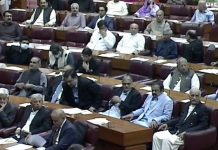Fitch Ratings revised down its forecasts for the Pakistani rupee on Thursday for both this year and next due to a variety of factors including an increased flow of US dollars into Afghanistan, projecting an average rate of 180 versus a previous forecast of 165 in 2022.
The forecast of the New York-based agency — one of the three major global rating agencies — for the rupee’s average rate this year is now Rs164 to the US dollar compared with Rs158 previously, according to news agency Reuters.
A day ago, stocks fell nearly 3 percent while the rupee dropped to a record low at Rs170.27, as investors feared a US Senate bill that is seeking to impose sanctions on the Afghan Taliban could be extended to Pakistan.
The rupee, which has been termed the worst-performing currency in Asia, seems to have opened the field for the bullish US dollar to move forward unchecked and erode the remaining value of the local currency.
The currency has been losing purchasing power fast in the domestic market as well, causing inflation that has badly hit the general public.
On August 26, 2020, the dollar hit Rs168.43. Then it started declining and reached Rs151.83 on May 14, 2021. However, the greenback started rising and has appreciated by 6.6 percent and 9.9pc since June and May 14, 2021, respectively.
The State Bank of Pakistan (SBP) had indicated earlier that the dollar could appreciate during the current financial year due to an expected higher current account deficit.
Now in its projections for 2022, Fitch expects an average rate of 180 versus a previous forecast of 165.
“Our expectation for the currency to weaken further is based on Pakistan’s worsening terms of trade, tighter US monetary policy, alongside the flow of US dollars out of Pakistan and into Afghanistan,” it said.
Analysts say the rupee has been hit by consistently high demand for dollars due to the country’s current account deficit while the Afghan situation is increasing pressure.
Over the long term, tightening US monetary policy alongside higher structural inflation relative to the United States would weaken the rupee against the dollar, Fitch said.
It said, however, that the undervaluation of the rupee on a real effective exchange rate basis would limit excessive weakness in the currency.









